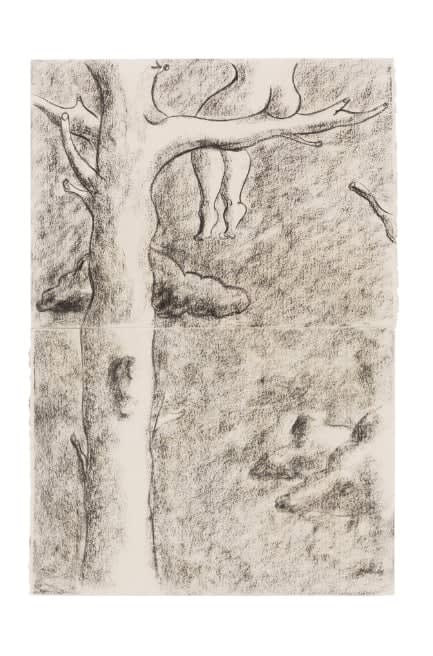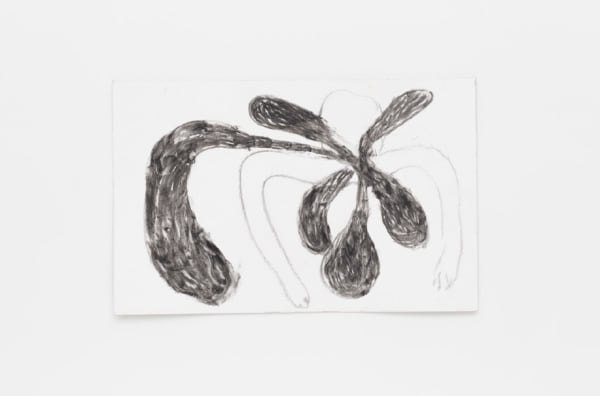Prediction Group show
Curated by Milovan Farronato
Giorgio Andreotta Calò, Adriano Costa, Raúl De Nieves, Patrizio di Massimo, f.marquespenteado, Chiara Fumai, Celia Hampton, George Henry Longly, Christian Holstad, Runa Islam, Zhana Ivanova, Goshka Macuga, Solange Pessoa, Liliana Moro, Christodoulos Panayiotou, Naufus Ramirez-Figueroa, Mathilde Rosier, Prem Sahib, Daniel Steegmann Mangrané, Santo Tolone, Erika Verzutti, Wilhelm von Gloeden, Philip Wiegard
Paris, 12 February 2016
Dear Milovan,
Last night I dreamed of nothing: Pure black. And a voiceover: the voice of Marilyn Monroe.
She repeated only four words in the most disheartening crescendo: I knew it anyway. She said this over and over for quite some time: I knew it anyway, I knew it anyway, I KNEW IT ANYWAY, I KN-NE-E-E-W IT A-A-A-ANYWA-A-AY. It started as a soft caress. The breathy unstable whisper of the blonde type we’ve been taught to prefer. But Marilyn's whisper soon transformed into an acute stuttering scream. Louder and louder. I woke up feeling perturbed. I called Jean. He told me that Marilyn had a life-long stuttering problem and took many lessons to conceal it. Once she tamed her own voice she consciously trained herself to sound as if she was just waking up and by consequence we all thought to wake up next to her. I then realized that I dreamed of Marilyn’s return to being Norma Jeane. I saw Marilyn waking up next to her disenchanted. Hearing her real voice and seeing her perform the most secret role she ever played, herself.
I remember vividly the day at school when I was introduced to the term of Tragic Irony. It was a warm October. I must have been a high school freshman. It was during one of the first lessons of Ancient Greek Literature I ever had. We were studying Sophocles’ Oedipus the King and our teacher presented Tragic Irony as the sole filter through which one shall read ancient drama. She said that when the words and actions of the characters contradict the real situation, which the spectators fully realize this adds a specific tension in the narration. Many years later, in France, I would learn that the term Tragic Irony was unknown to the ancient Greek poets and thus could have not been an end in itself. It was coined many centuries later, in 1833, by an Anglican Bishop named Connop Thirlwall and it seems to be the pure product of the encounter between Christian Morality and Romanticism.
On the very same day that our teacher introduced us to the term of Tragic Irony, my school friend Eva invited me to watch – for the first time – Gentlemen Prefer Blondes. It was the second film with Marilyn that I was watching and the extract which fascinated me most was the only part in which Marilyn disappears to give place to Jane Russel singing Aint that Αnyone Ηere for Love. I don’t know why but I was totally mesmerized. Perhaps it was due to the graceless dance of the athletes or the slightly discoordinated moves of Russel... surely the highly eroticized meeting of those two inflexible bodies.
Somewhere, around the 4th minute, I noticed an accident. While the athletes are jumping aligned on top of Russel’s head one of them violently hits her head and drags her into a swimming pool, legs up. It was not planned, it looked quite brutal, but for some reason they kept it in the final cut of the film. Maybe they liked it, maybe they found it funny, or perhaps they meant it as a conscious entry to the cinematic mythology of trivia – a private joke? Who knows...
From that day on, I developed a sick obsession with watching and re-watching the scene of the accident, the whole scene, or just that exact moment. I rewound and watched it, rewound it again and re-watched it over and over. And it was through this endless ceremony that I got to understand better the term of Tragic Irony from a more dynamic perspective. That of the vicious cycle enclosing the viewer, the actor, the action, and the character who is trapped in the action. The awareness of what is expected to happen as well as of our inability to do anything but to watch it happening.
We know the myth, we’ve seen the film, Jocasta is going to hang herself and the sexy athlete is going to drag Russell into the pool, but nobody will stop Jocasta’s incest with her son Oedipus or reverse the scene which is being projected. We are both paralyzed and fascinated by the events and their repetition.
Tiresias, the blind prophet of Apollo in Thebes, knows what he does not want to tell Oedipus, but he will still say it and the tragedy will occur. He knows it, we know it as well. And this is the key to a double Irony: The fate of the king who married his mother and that of Tiresias who would predict the most horrible things even before they become part of the narration. If Oedipus is enslaved once by his fate, Tiresias is enslaved twice. He is the catalyst of the narration while he stands before it. He is the dramatic motor and a tragic element himself. A perfectly constructed mirror of the spectator one might say.
Our teacher told us that the wise clairvoyant, beyond his power to predict the future, had enjoyed a unique privilege in the imaginary of Greeks. Tiresias was the only man to have ever been transformed into a woman. He had thus lived as a woman and had an internal understanding of both genders: in one version of the myth he lived for seven years as a priestess at Hera’s Temple, he got married and had children. In a different version he lived as a prostitute of great renown.
I imagine Tiresias speaking with the voice of Marilyn, whispering with flickering desire the will of the Gods to humans and the secret lives of humans to the Gods. One day, he was summoned to Mount Olympus in order to assist Zeus and Hera with an argument they had. They disagreed on who has more pleasure in sex. Of ten parts a man enjoys one only. Tireseas replied, with the voice of Marilyn. Hera, upset, struck him instantly blind. He did not therefore lose his vision because he predicted something bad, but because he confirmed a fact.
A team of scientists announced on Thursday to have recorded the sound of two black holes colliding a billion light-years away. A fleeting chirp that confirms Einstein’s general theory of relativity. I tried to imagine the faint rising. It must have sounded like Marilyn’s flickering voice and Einstein must have heard it long before. As he predicted more than a century ago what is just now being proved and as he must have woken up with the voice of Marilyn several times before that.
Rumor has it that Marilyn and Einstein had an affair. Marilyn had several pictures of Einstein in the places she lived and one of them bore a note in Einstein’s handwriting: To Marilyn, I am forever grateful!. Was he grateful because her fvoice had made him understand on a warm October morning how gravitational waves ripple in the fabric of space-time? Isn’t it a great paradox that it took us so long to confirm what Marilyn had known and whistled to Einstein?
I am looking forward to seeing you soon in London.
With love from the land of unfulfilled predictions,
– Christodoulos
-
 Giorgio Andreotta Calò
Giorgio Andreotta Calò -
 Giorgio Andreotta Calò
Giorgio Andreotta Calò -
 Giorgio Andreotta Calò
Giorgio Andreotta Calò -
 Adriano Costa
Adriano Costa -
 Raul De Nieves
Raul De Nieves -
 Raul De Nieves
Raul De Nieves -
 Raul De Nieves
Raul De Nieves -
 Patrizio Di Massimo
Patrizio Di Massimo -
 Patrizio Di Massimo
Patrizio Di Massimo -
 Patrizio Di Massimo
Patrizio Di Massimo -
 Patrizio Di Massimo
Patrizio Di Massimo -
 Fernando Marques Penteado
Fernando Marques Penteado -
 Chiara Fumai
Chiara Fumai -
 George Henry Longly
George Henry Longly -
 George Henry Longly
George Henry Longly -
 Christian Holstad
Christian Holstad -
 Christian Holstad
Christian Holstad -
 Christian Holstad
Christian Holstad -
 Runa Islam
Runa Islam -
 Goshka Macuga
Goshka Macuga -
 Solange Pessoa
Solange Pessoa -
 Solange Pessoa
Solange Pessoa -
 Solange Pessoa
Solange Pessoa -
 Solange Pessoa
Solange Pessoa -
 Solange Pessoa
Solange Pessoa -
 Liliana Moro
Liliana Moro -
 Christodoulos Panayiotou
Christodoulos Panayiotou -
 Christodoulos Panayiotou
Christodoulos Panayiotou -
 Christodoulos Panayiotou
Christodoulos Panayiotou -
 Mathilde Rosier
Mathilde Rosier -
 Mathilde Rosier
Mathilde Rosier -
 Mathilde Rosier
Mathilde Rosier -
 Prem Sahib
Prem Sahib -
 Prem Sahib
Prem Sahib -
 Daniel Steegmann Mangrané
Daniel Steegmann Mangrané -
 Daniel Steegmann Mangrané, Ramita Partida, 2016
Daniel Steegmann Mangrané, Ramita Partida, 2016 -
 Santo Tolone
Santo Tolone -
 Wilhelm Von Gloeden
Wilhelm Von Gloeden -
 Wilhelm Von Gloeden
Wilhelm Von Gloeden -
 Wilhelm Von Gloeden
Wilhelm Von Gloeden -
 Philip Wiegard
Philip Wiegard -
 Philip Wiegard
Philip Wiegard -
 Philip Wiegard
Philip Wiegard

















































